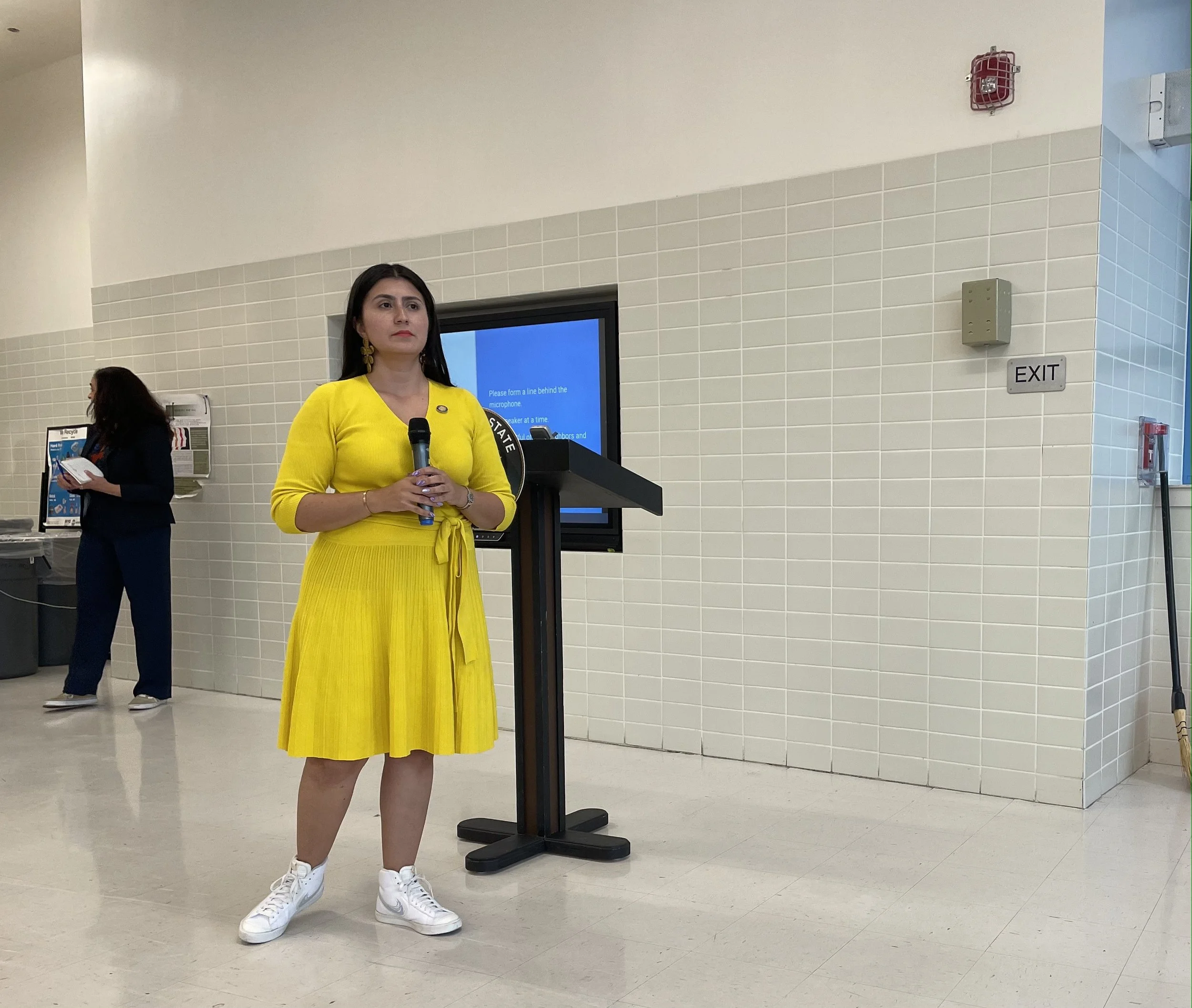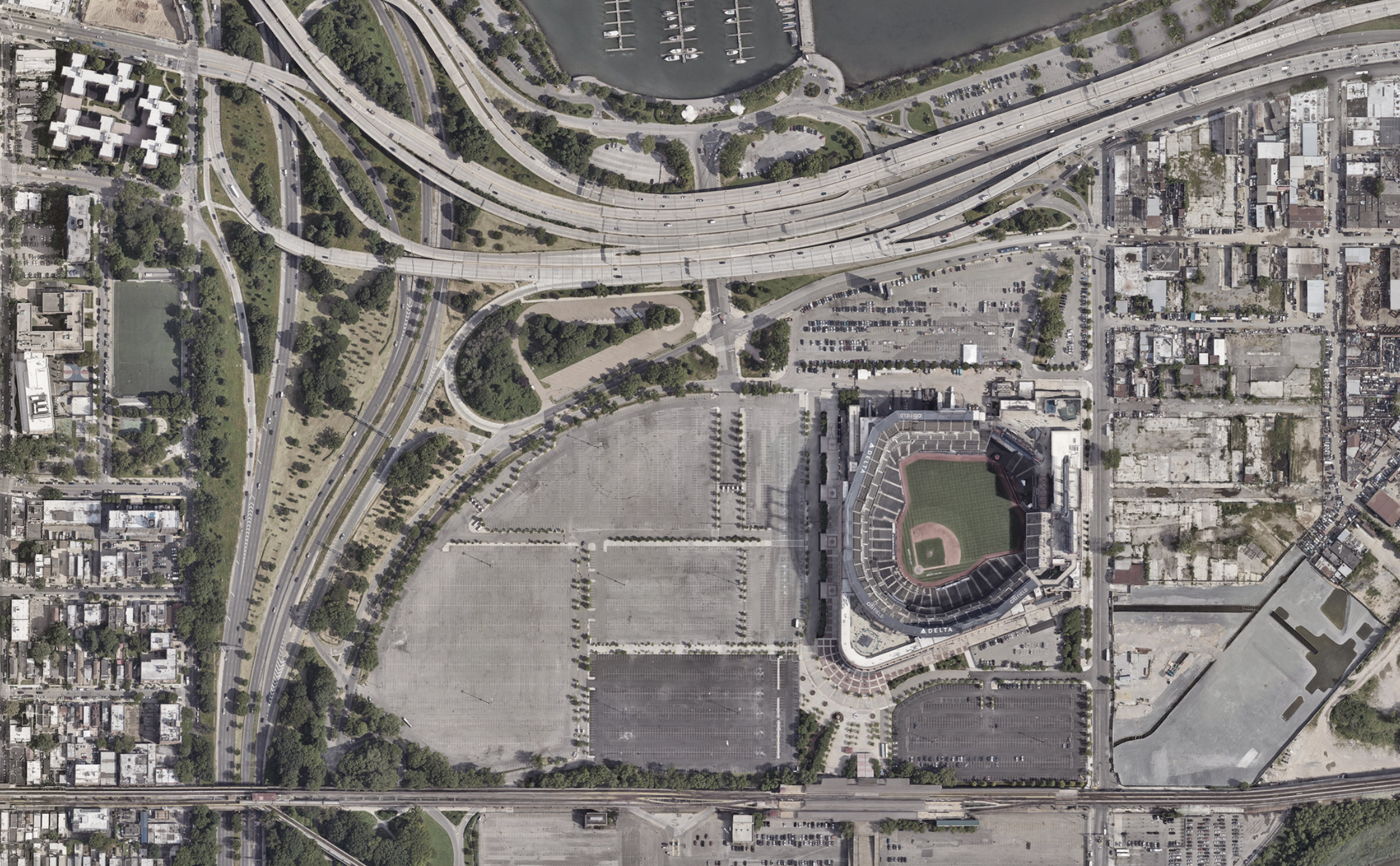Ramos' 'unscientific’ survey shows opposition to Cohen casino proposal
/State Senator Jessica Ramos at a May 2023 town hall on Steve Cohen’s casino proposal. The senator sent out a survey recently that found that 69 percent of respondents opposed a casino in their neighborhood. Eagle file photo by Jacob Kaye
By Jacob Kaye
Nearly 69 percent of respondents to a new survey from State Senator Jessica Ramos said they didn’t want a casino built in their neighborhood as Mets owner Steve Cohen continues his bid to bring one to Citi Field’s parking lot.
The informal and unscientific survey sent to those signed up to both Ramos’ campaign and constituent email list and shared exclusively with the Eagle is the latest effort made by the Western Queens elected official to gauge public opinion on the controversial casino proposal as she continues to weigh whether or not she’ll allow Cohen’s bid to move forward or to block it.
Ramos – as well as her Assembly counterpart, Jeff Aubry – holds outsized power over Cohen’s casino wish, which the billionaire hedge fund manager wants to build on a parcel of land that is not only owned by the city but is technically designated as parkland. In order for Cohen, who is one of around a dozen developers attempting to win one of three downstate casino licenses expected to be handed out by the state’s Gaming Commission late next year, to build on the lot, he’ll need express permission from Ramos, Aubry and the entire state legislature through what is known as a “parkland alienation” bill.
While Aubry has already introduced such a bill, Ramos has not, nor has she publicly issued either her opposition to Cohen’s proposal for the casino and entertainment complex known as Metropolitan Park or her support.
Ramos said she’ll come to a decision on the project at some point in May, just before the end of the legislative session on June 6.
Impacting her decision will be the survey, the three town halls she held on the proposal, a number of meetings with local boosters and opponents, conversations with constituents, as well as efforts to collect feedback on the project conducted by Metropolitan Park.
“I'm trying to use this time to maximize opportunities for engagement and outreach,” Ramos said during a phone interview with the Eagle. “I think all of this outreach that I'm doing largely comes from the pressure of making such a consequential decision for generations to come.”
Ramos admits that her latest survey is not the most scholarly effort to collect feedback – she called it both “very unscientific” and “rudimentary.”
The survey, which was sent to around 29,000 people, included just five questions: “Which neighborhood do you live in?” “Have you heard of the proposal to build a casino next to Citi Field?” “Do you want a casino in your neighborhood?” “Why or why not?” and “What would you like [Ramos] to consider when she is deciding whether or not to introduce legislation that would allow a casino to be built in Corona?”
Overall, 68.9 percent of the 959 total respondents said that they did not want to see a casino built in their neighborhood – respondents self-identified as being residents of either Jackson Heights, Corona, East Elmhurst, Elmhurst, Rego Park or listed their neighborhood as “other.”
But responses varied greatly from neighborhood to neighborhood.
In Jackson Heights, which accounted for over half of the respondents, around 78 percent said they didn’t want a casino. Exactly 50 percent of respondents who said they were from East Elmhurst said they didn’t want a casino in their neighborhood – 42 percent said they did want a casino and 8 percent said they weren’t sure. Thirty of the 40 respondents who said they were from Elmhurst said they didn’t want a casino.
But one neighborhood was supportive of the idea.
Respondents who said they were from Corona – the neighborhood that technically houses Citi Field – said they would support a casino as their neighbor. A little more than 55 percent of the respondents from Corona expressed their support for Cohen’s project in the survey.
Though the lawmaker said she took note of the quantitative data gleaned from the survey, she said most important was the qualitative data.
“You can kind of see…the why’s and where people are, what it is that they’re really yearning for,” Ramos said.
Though much of what respondents said in the survey has previously been expressed at Ramos’ town halls, the survey makes clear the pros and cons of the project and the battle lines that have long been drawn.
An overhead view of Citi Field. Mets owner Steve Cohen has proposed building a casino in the stadium’s parking lot. Photo via Metropolitan Park
Those who support the project tout its potential economic benefits – representatives from Metropolitan Park claim the $8 billion project will create 15,000 union jobs and will include $1 billion in “community investments,” including upgrades to the 7 line subway station outside of Citi Field, new park space and playing fields.
In addition to the casino, the plan for Metropolitan Park includes building a hotel, 20 acres of new park space, a live music venue, a food hall, bars, restaurants, public athletic fields and several parking garages in the immediate 50-acre area surrounding the baseball stadium.
“A casino would bring much needed jobs, support, and revenue to the local community,” one anonymous respondent who said they were from Corona said in the survey. “Also, besides tangible potential, this project would bring a much needed revitalization to the community.”
Those opposed to the project said that they worried a casino would fuel or create gambling addictions among those in Queens already facing precarious financial futures. They also said they were concerned about increases to traffic and general congestion. Among the most repeated sentiment was the idea that the land should be used to build something other than a casino and entertainment complex, be it housing, a healthcare facility or a new park.
“We need more parks and community centers for our kids, not a casino,” one respondent said.
Ramos said that one of her biggest takeaways from the survey was that there generally was “a yearning to make better use of this empty plot of land.”
The survey now becomes one of a number of public feedback efforts about the casino proposal that has been conducted in the past year and a half. However, the large volume of surveys, polls, town halls, community meetings and visioning sessions have shown varying results.
Not long before Ramos sent out the survey, the lawmaker commissioned a poll to be conducted by Slingshot Strategies, which was first reported by THE CITY. The poll was paid for by an “anonymous donor” who Ramos declined to identify to the Eagle, though she noted the donor paid Slingshot directly and did not go through her campaign.
According to reporting by Politico, Slingshot Strategies lists both Resorts World New York City and Bally’s among their list of past and current clients. Both companies are also vying for one of the three casino licenses eyed by Cohen. Additionally, Slingshot lists lobbying firm Metropolitan Public Strategies among its clients, as well. The firm is working for both Resorts World and Bally’s.
The Slingshot poll, whose questions were approved by Ramos, found that 61 percent of respondents said they don’t want a casino built anywhere in Queens and 75 percent said they don’t want one in their neighborhood, THE CITY reported.
Around the same time Ramos commissioned the Slingshot poll, Metropolitan Park commissioned a poll of its own from pollster Doug Schoen. The poll found that around 80 percent of respondents supported the proposal after those conducting the poll shared “details of the project and messaging on its benefits for the community.”
When asked about the favorability of each individual element of the proposal, support both boroughwide – 88 percent – and within Ramos’ district – 94 percent – was highest in response to the plan to build new park space and playing fields. Support was lowest for a “hotel with a live music venue and casino gaming – around 76 percent boroughwide and 62 percent within Ramos’ Senate district said they supported that element of the project.
Public response to the project has also varied at all three of Ramos’ town halls. The first event, held last May, mostly featured residents who said they were opposed to the project, as well as a group of young people carrying signs in support of the project paid for by Cohen who declined to speak with the press.
The second town hall, held in November, was more evenly split. The event was attended by a large number of union workers, most of whom voiced their support for the project and who also mostly declined to speak with the press.
The most recent town hall was held in February and saw slightly more support for the casino project. The town hall was presented as more of a debate between Metropolitan Park representatives and representatives from a competing proposal dubbed Phoenix Meadows. The competing proposal, which does not have any serious financial backing and is in its earliest stages of planning, would effectively see a park come to the entirety of the Citi Field lot.
When asked how she approaches the varying results of the polls and town halls, Ramos said that she trusts the feedback efforts she’s pursued more than she does the ones pursued by Metropolitan Park.
“The difference between me and them is…I'm actually on the ground talking to my neighbors myself and we're having this conversation firsthand,” Ramos said. “I was born and raised in my neighborhood. They're never going to be able to pay and have the relationships that I have built over the past 39 years of my life. It's just not comparable.”
“I am an elected official,” she added. “They are a company with an interest in profiting off of this public plot of land.”’
When asked for comment, a spokesperson for Metropolitan Park defended the group’s outreach efforts.
"For the past three years, Metropolitan Park has conducted an unprecedented level of community outreach,” the spokesperson said. “It's clear the community is overwhelmingly supportive of the vision and the 15,000 good-paying union jobs, 20 acres of new park space, and $1 billion in community benefits that come with it."
Ramos said that in the approximate month before her self-imposed deadline to make a decision on the parkland alienation bill, the efforts to collect public feedback won’t stop and that she won’t come to a public decision on the project until then.
“I want to remain open,” she said.





